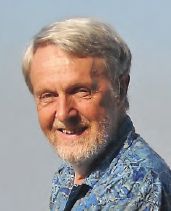
Physiology News Magazine
Obituary: Roger C Woledge
1938 – 2015
Membership
Obituary: Roger C Woledge
1938 – 2015
Membership
Nancy Curtin
Imperial College London & Royal Veterinary College, UK
Di Newham & Stuart Bruce
King’s College London, UK
https://doi.org/10.36866/pn.102.44

Roger died suddenly in March following a riding accident. His favourite recreational activity was riding his horse in Epping Forest near his home. Despite being 76 years old and having officially retired from University College London (UCL) over a decade earlier, he continued to work virtually full time. His father, Brian, was Head of French at UCL but encouraged Roger and his sister to study science. Roger went to UCL as an undergraduate Physiology student, essentially due to a general interest in biology. He remained in the UCL Department of Physiology, becoming Professor of Experimental Physiology and subsequently Head of Department until he moved to UCL’s Institute of Human Performance at Stanmore as its Director. After his ‘retirement’ at 65, which was the compulsory retirement age at the time, he continued his productive research career, particularly with colleagues at Imperial and King’s Colleges, Queen Mary University of London and the Royal Veterinary College.
Throughout his career, his driving research interest was the physiology of skeletal muscle in which he had an exceptionally broad range of experience and expertise. His early work, under the supervision of A.V. Hill, involved measuring the heat produced during contraction in frog muscle and was followed by measurements on tortoise, mouse and fish muscle. Interestingly AV did not ‘believe’ in the PhD degree, but later Roger was encouraged to register for one by Doug Wilkie who supervised his studies. For many years, he spent part of the summer working at the Marine Biology Association laboratory in Plymouth which he particularly enjoyed. The interest in muscle energetics continued throughout his life and earned him an international reputation. Much of this work was carried out with his friend and collaborator Nancy Curtin, with whom he was still working at the time of his death at the Royal Veterinary College. Latterly his research interest broadened to encompass human muscle physiology, particularly the muscle changes associated with ageing and their relation to the clinical problem of falls.
In addition to his research achievements, Roger was an inspiring teacher who strove to make his subject, and Physiology in general, interesting and understandable. His enthusiasm, clear delivery and sense of fun made him as popular with students as he was with his peers and colleagues. While Director of the Institute of Human Performance at Stanmore he developed an MSc programme which had a huge impact on many clinicians by giving the research knowledge and skills to evaluate and modify their clinical practice. Despite his phenomenal intellect, his broad interest and personality made him a very approachable man who never made anyone feel they were asking a stupid question.
Roger was an exceptional person who combined his remarkable intellectual knowledge and ability with a great sense of humour. He had a real interest in whatever research people were working on and gave generously of his time and expertise to anyone who approached him. As a result of his generosity combined with his expertise in data analysis and statistics, he became mentor, colleague and friend to many. He is much missed.
